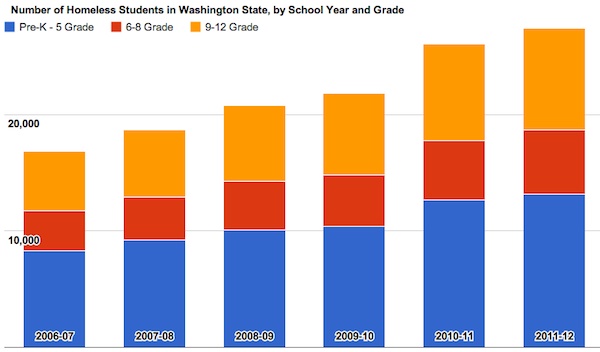Written by Denise Miller, Firesteel Advocacy Coordinator
Sara* is a bright, friendly teenager who cares about her grades, plays basketball, and volunteers in her community. But a couple of years ago, in middle school, she started acting up in class. Sara’s mom, called in to school to talk about the girl’s disruptive behavior, explained to the teacher and principal that after Sara’s dad lost his job, their family lost their home, and had spent months bouncing around motel rooms and shelters in different cities around Seattle. Sara was having trouble to adjusting to not knowing where she’d sleep each night.
“We’re living like we’re poor,” Sara once complained to her mom during their eight months of homelessness.
“We’re not living like we’re poor. We are poor now,” her mom told her.
Everyone in the family struggled with their new reality. Sara’s mom told me it was painfully difficult for her to swallow her pride and admit their situation to anyone. She and her husband are hardworking people who were more accustomed to helping others than asking for assistance.
School staff said they understood the tough circumstances and would treat Sara with sensitivity. Unfortunately, what they didn’t do was inform the family about their rights under the McKinney-Vento Homeless Education Assistance Act. This federal law provides protections for students like Sara who are experiencing homelessness. For example, she had the right to be transported to her school in Seattle, even when she was temporarily living outside district boundaries in a SeaTac motel. She also had the right to assistance with school fees and supplies.
Helping Homeless Students
It wasn’t until Sara’s family connected with a religious charity that they learned about their rights under McKinney-Vento.
Why hadn’t school staff informed them? It’s likely that the principal and teacher weren’t trained on the provisions.
Fortunately, local advocates are working to ensure that educators and service providers are equipped to help the more than 27,000 homeless students in Washington state.

Seattle/King County Coalition on Homelessness (SKCCH) recently published a “Helping Homeless Students” guide that explains which students are considered homeless and what their rights are. The guide lists all the King County homeless education liaisons who help homeless students and families access supports and services. (Liaisons for the entire state are listed on the Office of the Superintendent of Public Instruction’s website.)
SKCCH also hosts an annual workshop just before the start of the school year to teach people who work with homeless students about McKinney-Vento. In coming weeks I’ll share takeaways from that workshop and write about The Classroom Experience, an activity that Columbia Legal Services is developing to help build understanding of the challenges student homelessness creates in classrooms.
Learn more
Over the next several days, as young people across the state settle into their classrooms, we’ll share guest posts exploring the issue of student homelessness. Tomorrow we’ll feature artwork and two short creative writings about school by homeless youth who are interning with Catholic Community Services’s Zine Project. On Friday, YouthCare’s executive director will explain how the Seattle-based nonprofit is helping homeless youth who don’t fit into the school system earn their high school diplomas and GEDs. Finally, on Monday, a recent college graduate will share how her family’s experience with homelessness during high school motivates and informs her advocacy work.
Stay tuned to this blog and check out the following resources to learn more:
Office of the Superintendent of Public Instruction (OSPI)
Columbia Legal Services’ SchoolHouse Washington
The National Center on Homeless Education
The National Association for the Education of Homeless Children and Youth
What can you do?
Suggested actions from the excellent “What Back to School Means for Homeless Children” post written by Seattle University’s Project on Family Homelessness’ Catherine Hinrichsen last year still apply:
- If you’re a parent experiencing homelessness, exercise your children’s rights by contacting your school district’s homeless education liaison, or the OSPI.
- If you’re a teacher, school administrator, bus driver, or other staff member, see the “Five in Five” lists in OSPI’s educator’s guide, “Amanda Goes to School.” Find out who your district’s homeless education liaison is. Check the halls of your school; is there information about McKinney-Vento posted prominently? Find out what training is available to you from your district. In King County, you can learn about SKCCH training by signing up for their e-news.
- If you’re a parent fortunate enough to be stably housed, consider hosting a book, clothing, school supply or instrument drive at your school or church. Another easy thing to do is to always add a few bucks onto the checks you write for field trips and lab fees, so that schools can more easily cover the costs for kids who can’t afford it.
*This young person’s name has been changed to protect her privacy.
